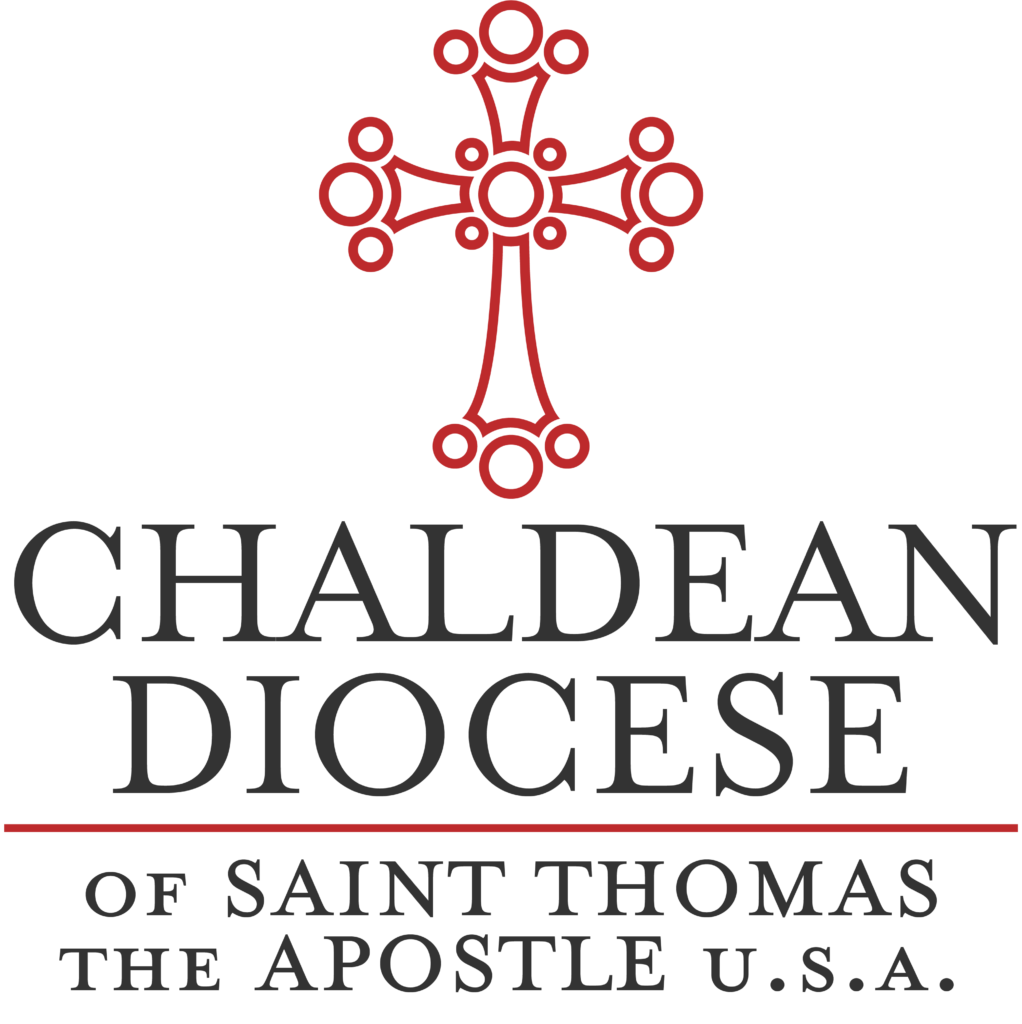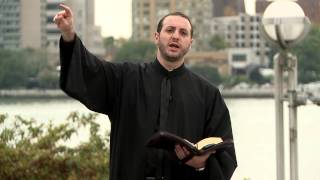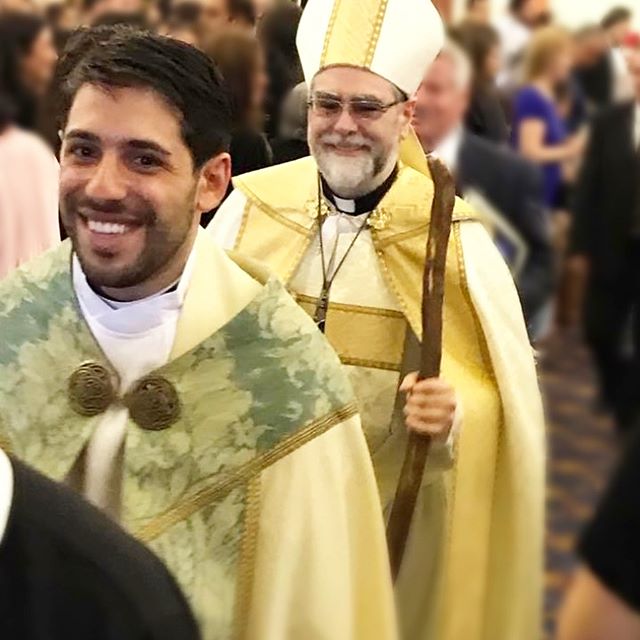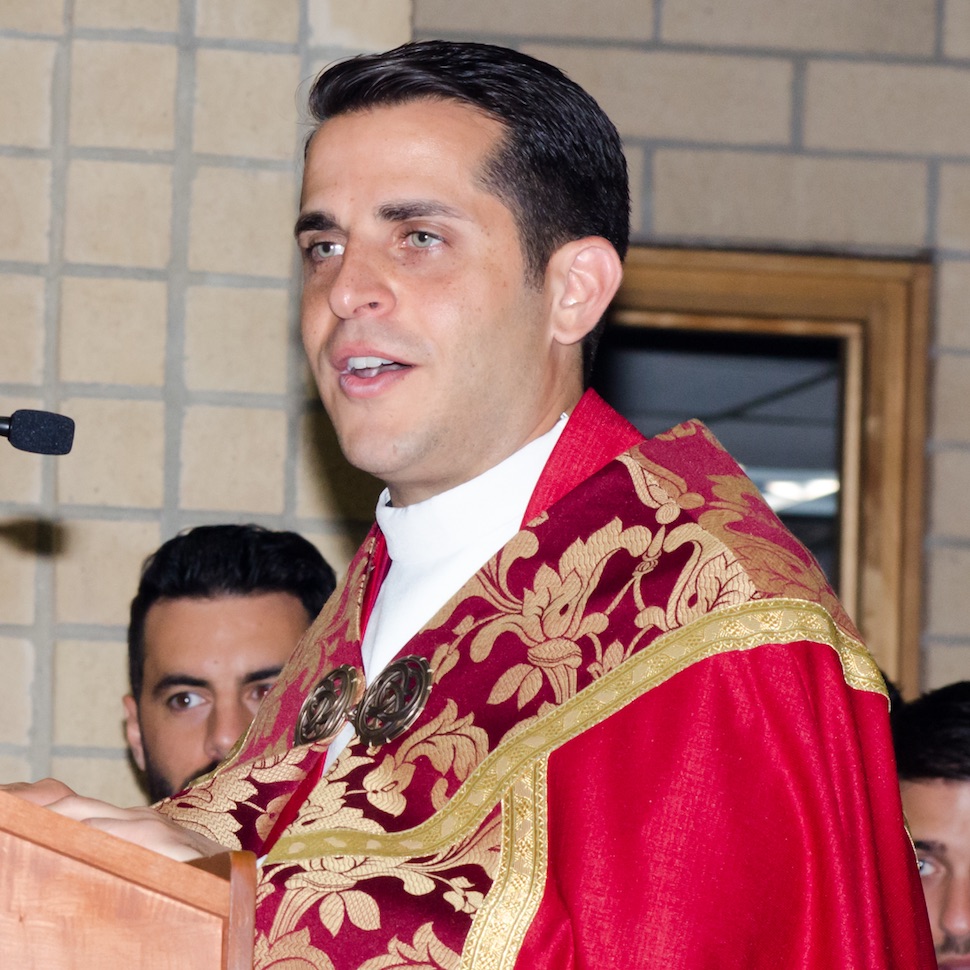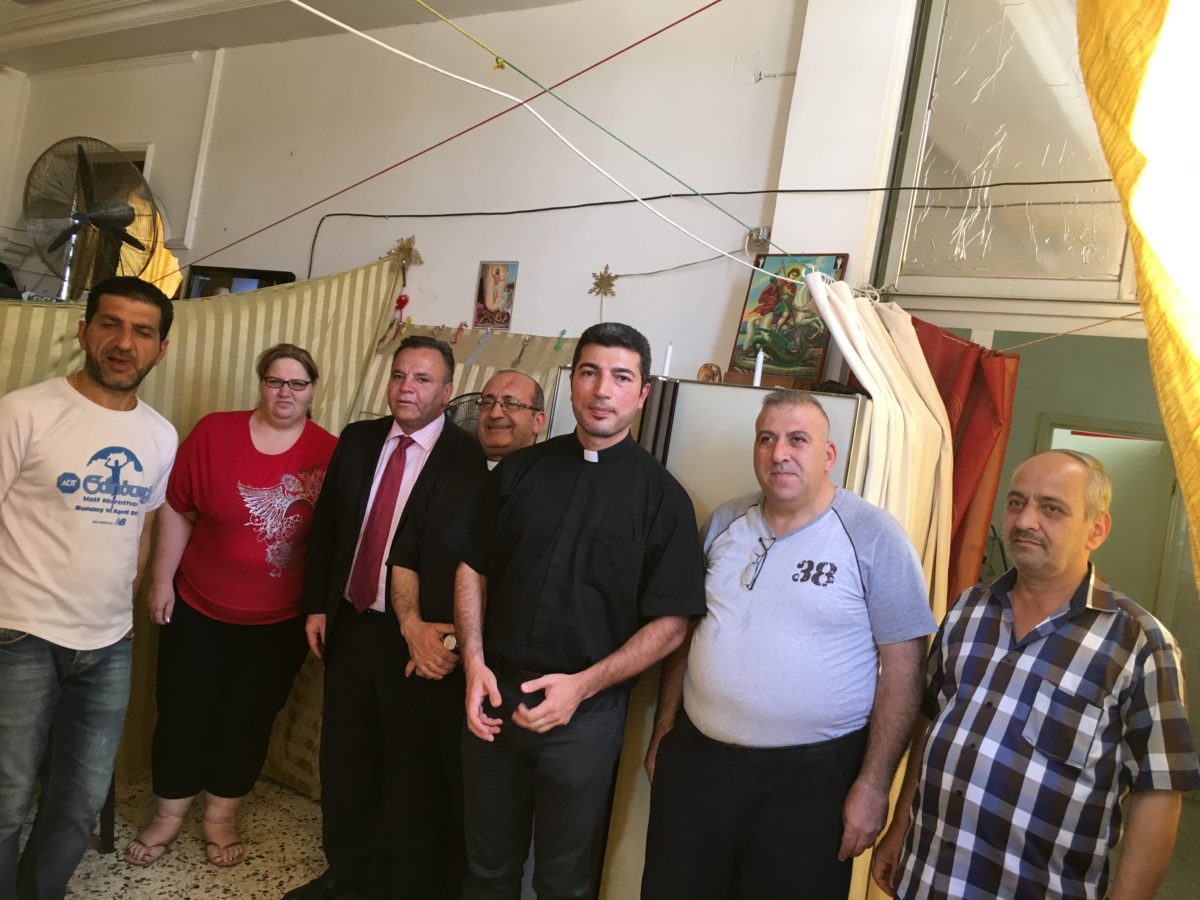An interview with Fr. Patrick Setto
Fr. Patrick Setto is the newest ordained priest of the Chaldean Catholic Eparchy of St. Thomas the Apostle, ordained July 2nd of 2017. Fr. Setto answered these questions when he was still a deacon preparing for his ordination.
Q: Tell me a little bit about yourself. (Home parish, family background, etc.)
I am the son of Moayad and Laman Setto, and I am the youngest and only boy with three older sisters: Lisa, Sandra, and Terry. I grew up serving as an altar boy at St. Joseph’s Church, and I have always loved to be around family and friends.
Q: Tell me a little bit about your faith background.
Ever since I could remember, I have been naturally drawn to Jesus, Mary, and the saints. As a young boy, my favorite movie that I watched all day long was the 6.5-hour movie, “Jesus of Nazareth.” I would watch this day and night while dressing up like Christ and reenacting the characters as I watched. I would also would play “Mass” with pita bread and collect religious statues and images. All of this was natural for me without anyone telling me to do it. Because of this, my parents would bring me to mass, and I would serve as an altar boy. My grandmother also had a huge influence on my faith. When she would babysit me, she would sit me on her lap, and I would hold one half of the rosary and she the other and we would pray together.
Q: What led you to the priesthood?
Priesthood was always something I thought about. Growing up, I retained a strong love for God; however, it wasn’t until I was 18 when I went on Kairos and had a personal encounter with Jesus. It was after that retreat that my life completely changed, and my love for Jesus went from simply images to a real person. This change came about in me when I finally came to learn the truth about Jesus in the sacraments—especially in the Eucharist—and God’s endless mercy through the sacrament of reconciliation. As I received God’s love and mercy in such an effective way through these great sacraments, I desired nothing else than to share them with everyone I came in contact with. I participated in leading other retreats and teaching in youth groups such as JCU, where I found so much joy and satisfaction. I was later introduced to The Diary of St. Faustina where I learned about Jesus’ endless mercy (which I found myself so much in need of). As I learned about Jesus’s thirst to save souls and to pour out His mercy on sinners, I began to taste a little of this thirst to save souls. It was then that I realized that my vocation was to share this love and mercy in the most direct way with the whole world, and that is primarily through the priesthood.
Q: Why become a priest?
Simply because of the Eucharist. Christ gave up Himself on the cross for our salvation, and it is that same Christ who continues to offer up Himself by coming to us in the form of ordinary bread. If this is true, it is worth giving up everything else just to make Jesus present through the sacraments, especially In the Eucharist.
St John Paul II once said that “one finds his true self in giving of himself.” There is nothing more fulfilling than to be able to give myself to Christ through giving my whole self to the others.
Q: Any special memories of past pastors/priests?
I will never forget the time back in 2009 when I was still discerning whether God was calling me to seminary. I was waiting in line for confession at St Cyril’s, and I was praying the first joyful mystery, “The Annunciation,” and I was asking Our Lady to help me say yes to God if he is calling me the way she said “yes” to God at the Annunciation. I asked her to give me a sign if God was calling me and if she was to lend me her “yes” to God. After entering the confessional and confessed my sins, the priest, who was Fr. Valerian Rykowski—an extremely holy and gifted priest—asked me to come from behind the screen and sit in front of him. After asking me a few questions, he looked at me strongly and said, “You will be a priest.” There were other encounters where Fr. Val had told me that God was calling me, but this time, he prophesied that I would become a priest.
Another priest who has had a huge influence on my vocation is Fr. Ben Ludtke. From my very first confession with him until now, he has been nothing short of an amazing example of what a true priest must be like. My first confession with him was so special because he was able to show me God’s mercy and compassion in a way that I never had felt before. His love and devotion to hear confessions day in and day out for hours at a time really showed me just how merciful God truly is. I pray to have this same passion for the sacrament of reconciliation in order to show the world God’s endless mercy.
Q: How has your time in seminary help prepare you for your upcoming ordination?
Seminary was truly the greatest gift I have received in my life thus far. I would never be the man that I am today if it weren’t for seminary. Seminary life taught me to grow in many incredible human qualities such as discipline, patience, productiveness, sensitivity to others, and most of all, it taught me how to love Christ above all. Through our daily schedule of morning prayer and mass, to classes and ending the evening in prayer, we were truly able to grow in our love for Christ on a spiritual level and to grow as stronger men on a human level. Seminary focuses on forming us into priests on four different levels or pillars: the spiritual, human, intellectual and pastoral pillars. The program was set up for us to be able to work and grow in these four areas of our lives so that we could become more whole and healthier in mind, body, and soul. The more we are able to become whole, the more effective we are in helping others.
Q: What are you looking forward to most as a priest? What are you least excited about?
I am most excited about celebrating mass and hearing confessions. My whole motivation to become a priest was to make Jesus present in the Eucharist and to communicate his mercy through the sacrament of reconciliation. I am excited about just being able to be an instrument of Christ in whatever way that I can to help souls experience the concrete love of Christ so that they can be with him for all eternity. I am sure there will be things that don’t excite me as much about priesthood, but at this time I am so excited just to be a priest that I am not aware of anything that would make me unexcited.
Q: Is there anything that you find special about about our Eparchy that you would like to share?
I think what is so special about our Eparchy is that we are so closely connected by our culture. I also really love the fact that the youth play such a huge role in our Church. When looking at the Catholic Church at large, you don’t usually see the youth or young adults as involved in Church as you can see in our Church.
Q: How are you feeling about your first assignment at Mother of God in July?
I am really excited to be at our Cathedral because it is the mother parish of all the parishes in the diocese. I love that Mother of God is always offering all kinds of programs and activities that can involve the whole diocese. It is really the home Church that is able to bring all of the other smaller communities together to really feel like one family, and I really look forward to being able to serve not only our parishioners, but our diocese at large.
An interview with Fr. Bryan Kassa
Fr. Bryan Kassa celebrated his first year as a priest on July 2nd, 2017. He is currently an associate pastor at St. Joseph Chaldean Catholic Church in Troy, Michigan.
Q: Tell us a little bit about your call to the priesthood.
I don’t think I was taking my faith seriously until I was dating a girl who really challenged me to confess my sins. I thought, “I don’t need to do that, I’ll just confess directly to God.”
She said, “Do you believe that the Holy Spirit has been guiding the Catholic Church for the past two thousand years?” I said, “Of course, I do.”
“Do you think you’re smarter than the Holy Spirit?”
I thought, “Wow, she’s right. Who am I to say I don’t want to confess my sins to a priest?” I started to understand what the Church teaches is true and I fell in love with the Church. That was the beginning of my vocation.
I see now how God was working in that situation. The Church was able to answer all my questions rationally and logically, and I just started to love the Church even more.
Q: What about the priesthood do you enjoy most?
When I was in high school, I wanted to be a pediatrician. But the “Chaldean” in me didn’t want to wait eight years to finish college and so I changed my major to accounting. With that being said, I always wanted to be a doctor even as a young child because I wanted to bring healing into the lives of others. At the time, I didn’t understand how that desire would come to fulfillment, but now I do. As a priest, I am able to bring healing into the lives of others but it is a different kind of healing—it is spiritual healing. Like the body, the soul is a living component and needs healing. The same way God uses a doctor to heal the bod, he uses a priest to heal the soul. The soul can get sick from sin and/or previous traumatic experiences, and God in His wisdom uses a priest to heal His people through the Holy Bible, the Sacraments, and other forms of healing prayers. That is one of the things that I enjoy most about being a priest.
Q: What is it about the priesthood that you enjoy least?
The Chaldean language is a struggle for me in my priesthood. I love being Chaldean and I love our traditions and customs but the Chaldean language doesn’t love me back sometimes (that is supposed to be funny in case you didn’t laugh). As a priest, I have to use the Chaldean language to read the Holy Bible, funeral prayers and other Sacramental readings. Besides reading it, I have to speak Chaldean to my parishioners—not only in my homilies but also in one-on-one conversations, and it leaves me tongue tied at times; however, my parishioners are very encouraging and motivate me each day telling me that I am growing in my reading and speech. My response to them at times is, “If I am improving, why do I see you laughing at me at times?” which makes them laugh more, and I laugh too. It is important to be able to laugh at yourself. I like the quote, “Take your work seriously, but yourself lightly.”
Q: What have you enjoyed most about being at St. Joseph?
I love the faith of the people here. The majority of them know what a privilege it is to worship their Christian faith freely and they don’t take that for granted. That is something that many of us Chaldean Americans will never experience or understand. They worship with their whole heart! It is truly inspiring. Best of all, they tell me that they pray for me, so I know God hears the prayers of this faithful community!
Q: What does a typical day for you like?
I like to wake up at 7:30 am usually. I like to go for a run in the morning to help give my body the natural chemicals that it needs to help me stay focused. Running helps me channel any anxiety, fear, or worry that may try to creep its way into my life. After taking care of the body that God gave me, I take care of my soul by praying a Holy Hour in the adoration chapel. During my Holy Hour, I read the Holy Bible, which is God’s Word today for me! Even though He was speaking to His prophets thousands of years ago, the Holy Bible makes God’s Word alive today! I need to hear His voice. I need Him to guide me in my upcoming appointments. I need to fill myself up with Jesus before I even dare speak to people about spiritual matters. Next, I celebrate Mass then the meetings begin for the day. Those meetings can range from a married couple struggling in their marriage to someone who wants to learn how to grow in their personal relationship with Jesus. In between what I mentioned, I have to return phone calls, e-mails, text messages, visit people in the hospital, take care of people who want to speak to a priest without an appointment, and any other fun adventure which presents itself in between. It seems like a lot—and it is—but I love it. It is pretty incredible what God can do through a single person in one day.
Q: What can you tell us about Liquor Store Evangelization? How did it start?
Funny question! My parents are hard workers, and I always wanted to help them as much as possible at their store when I had free time. I did not enjoy being at the store, but it gave my parents some time off which made me happy. With time, I realized how miserable I was becoming at the store. I would get annoyed when I would see or hear a customer coming into the store. I couldn’t wait for them to leave at times and then one day it hit me—“What if that customer is Jesus?” So, I prayed this prayer, and my miserable life at the store began to change:
“Jesus, I don’t see You in these customers. I have a hard time loving them, but You love them. I am not sure what You love about them but You do. Since You love them and I am struggling to love them and to see You in them, I give You permission to love them through me! Help me to get out of the way!”
After that, I slowly started to feel the prompting of the Holy Spirit direct me to engage in conversations with the customers rather than rushing them out of the door. I wouldn’t wish people “good luck” after they played lottery, I would wish them “many blessings.” I wouldn’t wish them a “good day/night,” I would wish them a blessed day/night. When people asked me how I was doing, I would respond, “I woke up today, so for that reason alone, I am doing amazing.”
I talked my parents into getting rid of the pornography and condoms which were sold at the store which were against what we believed in as Catholics and when a customer would ask why we don’t sell condoms and pornography, I would bring up God’s law rather than man’s law—it was an opportunity to teach others what I believe in rather than hide what I believe in. If the “truth” that Jesus talks about will set people free, then I wanted my customers to be free from their addictions of alcohol, cigarettes, lottery, etc.
Our store is near a hospital, so when I would see a white hospital bracelet around their wrist, I would ask if they were okay and engage in conversation with them, reminding them that Jesus is the Divine Physician and that He loves them. Often times, I would offer to pray with them and on them right then and there.
Q: Tell us a bit about your spirituality. What is the most spiritually rewarding part of being a priest?
I like the spirituality of St. Therese of Lisieux. She speaks a lot about the “Little Way” to get to Heaven…how “little” souls—because they are weak, broken, and not perfect—need a shorter and easier way to get to Heaven because of their limitations and weaknesses. She really taught me a lot about God’s love and mercy because I often saw Him as a mean judge only. My spirituality is a combination of God’s love and mercy, but also as a Father who wants the best for His children and who continues to challenge His children so they can get to Heaven. As a priest, I love to be able to do the same with my parishioners…teach them about God’s love and mercy but also challenge them to be better Christians and to follow Christ without reserve.
Q: What has been the hardest thing about being a priest?
The hardest thing as a priest is finding a balance between being a happy, holy, and healthy priest. I believe that a lot of it has to do with the evil one.
I think that since a priest wants to save souls and the devil wants to ruin souls, it is hard to not fall for the devil’s tricks and lies. He tries His hardest to tell me that a particular person has no hope and that it is pointless for me to pray for that individual. Or the evil one tries to lie to me and trick me into thinking that I am not a good priest and have nothing to offer. He tries to make me believe that I am superman and that I don’t need a lot of sleep in hopes of me burning out. He tries to make me believe that I am super holy and don’t need to pray at times. He tries to trick me into thinking that I am the Savior of the world when in actuality, the world has a Savior already. His name is Jesus, in case you were wondering.
That is why it is important to stay close to Christ. To build that ongoing relationship with Him, not only as a priest, but also in general as a Christians living in this secular world.
Q: Where do you see yourself in the next 5 years?
In the next 5 years, I see myself still struggling with my Chaldean but loving every second of being a priest!
An Interview with Fr. Fadi Philip
This month, a group of missionaries will travel to Lebanon to give medical and spiritual aid to displaced Christians who have been forced to leave their homes due to wars and persecution. The team will be led by Fr. Fadi Philip, a Chaldean Catholic priest and the pastor of Our Lady of Perpetual Help in Warren, Michigan. His team will visit displaced families throughout the region to give them much needed medical and spiritual support. In addition to Fr. Fadi, the team includes five medical doctors: Ranin Paolus, M.D.; Maha Bishara, D.M.D.; Sara Alsakka; Michael Haddow, D.M.D.; and Rand Touma, M.D. The following is an interview with Fr. Fadi regarding the mission:
1. On December 26th of this year, you and a team of volunteers will travel to Lebanon on a medical and spiritual mission trip to help our displaced brothers and sisters. Although you have been on a number of mission trips around the Middle East, this will be the first medical and spiritual mission trip. How did you first get involved in these mission trips and what makes this trip different than the others before it?
Fr. Fadi: There are about 15,000 – 20,000 Christian refugees in Lebanon, so the need there is very great. In Lebanon, many of them have been stuck there for the past 3-4 years and are not sure when they will even be able to leave. To make matters worse, life in Lebanon is very expensive and people will generally focus on providing for food and a home for their families. Because of this, there is very little money to spend on other things, like medical care, and this is why many will only go to the doctor’s only when they get a health problem.Because they cannot afford to go to the doctor’s for a regular check-up and many cannot afford medical care at all.
Our main purpose in this mission trip is to help treat the refugees their in whatever way we can help them. There will be two physicians and two dentists travelling with me to help treat those who need medical care. Our goal, however, is not just a medical one but also a spiritual one, and I want to bring them the message that our Eparchy cares for them and loves them…that we are all one Church and that they have brothers and sisters that care for them and want to help them. As Christians, we are all called to help those who are most in need and to show them Jesus Christ by our words and actions. In addition to praying with the families, I will also be holding Bible studies for them.
2. Spiritually and practically, what are some things that you learned from these trips?
Fr. Fadi: They have changed my life and the way that I look at my vocation as a Christian. Jesus asks of all Christians to go to those who are in need and to help them in whatever way you can: “For I was hungry and you gave me food, I was thirsty and you gave me drink, a stranger and you welcomed me, naked and you clothed me, ill and you cared for me, in prison and you visited me.’ Then the righteous* will answer him and say, ‘Lord, when did we see you hungry and feed you, or thirsty and give you drink? When did we see you a stranger and welcome you, or naked and clothe you? When did we see you ill or in prison, and visit you?’ And the king will say to them in reply, ‘Amen, I say to you, whatever you did for one of these least brothers of mine, you did for me’ (Matt. 25: 35-40). Jesus is in every one of these people that we serve. It is as Mother Teresa says when she was serving the less fortunate in her own ministry: “I have an opportunity to be with Jesus 24 hours a day.” She said this because she was truly able to see Jesus in everyone that she met or helped.
3. Adopt a Refugee has recently celebrated its 10th anniversary. What is Chaldean Catholic Charities (of which Adopt a Refugee is a branch) and how have you seen Chaldean Catholic Charities help our displaced brothers and sisters in need?
Fr. Fadi: The Chaldean Catholic Eparchy of St. Thomas the Apostle seems to be the most involved in helping the our brothers and sisters who are refugees. Currently, we are helping about 650 families in Lebanon, 250 families in Jordan, and 200 families in Syria. In Iraq, MERCI has helped to start and fund 6 clinics throughout Iraq, helping to provide prescription drugs and medical care to our refugees. We also have programs, in Jordan and Lebanon as well, that help our refugees with affording medication. MERCI and Help Iraq also support special cases of people who need a procedure or surgery done because of medical emergencies and cannot afford its great costs.
We also have Students 2 Students (S2S), a program started by Help Iraq that involves college students in this Eparchy helping college students in Iraq, helping them with things like supplies, living costs, and transportation costs. We also have St. Jude Iraq, which specifically helps children. All of these organizations have been doing a great job, and they could not do any of it if it wasn’t for our community’s generous support.
4. What seems to be the greatest need of our displaced brothers and sisters?
Fr. Fadi: Their physical needs are many…they struggle to make enough to pay for rent, food and medication costs. But what struck me most is how much they hunger for Jesus, especially Jesus in the Mass. Once, I was on a mission trip in Turkey around Christmas time and I saw people crowding outside of a closed church. They held and kissed the main doors of the church as they said their prayers, praying everything that they knew and remembered, like the Lakhu Maran and the Qadeesha Alaha. During that trip, as we celebrated the Mass with them, many of them began to sob in joy as they received the Eucharist, as many of them had not been able to receive the Eucharist or go to a Mass for a number of years, some having been without Mass for 10 years!
Another story that I can remember is that we were celebrating Mass in an apartment building in a room on the 5th floor. Many had heard that Mass was being celebrated and had come to hear it. The entire hall and the stairway all the way down to the first floor was filled with people who simply wanted to hear the Mass. Not expecting the great amount of people who came to the Mass, I had to break each host into multiple pieces for everyone who came to receive.
5. In your estimate, how many displaced Christians are there that Chaldean Catholic Charities is trying to reach? How can one help to support the mission of Chaldean Catholic Charities?
Fr. Fadi: In Lebanon, there are currently 650 families that are being helped, but there are still around 2,000 more that need help. One can help by either donating to Chaldean Catholic Charities or by simply praying for our brothers and sisters who are displaced and for the many groups that help to serve them.
If you would like to donate specifically to this mission trip, you can either contact Fr. Fadi (email below) or donate through Chaldean Catholic Charities, writing ‘Lebanon Mission’ in the memo.
If you are interested in helping with this mission or future missions, or just would like more information, you can reach Fr. Fadi by email at [email protected].
If you’d like to donate to the Lebanon Mission, you can do so by clicking here
